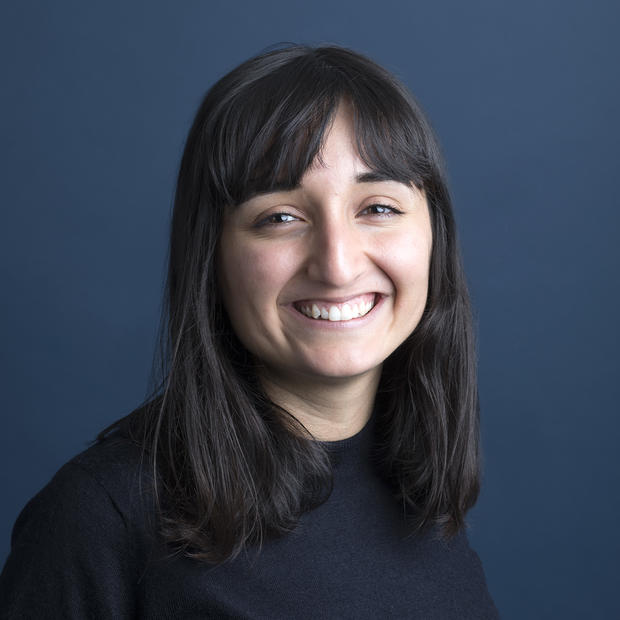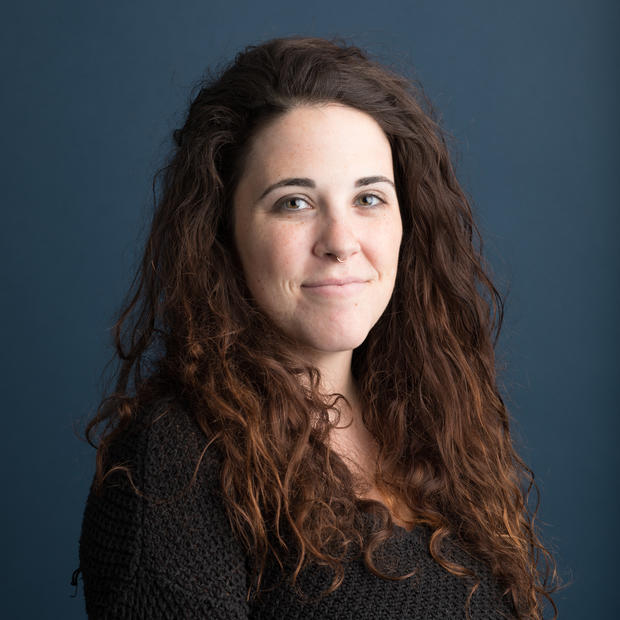She had just received a FaceTime call. When she answered it, she was greeted with the image of her client breathing heavily in a hospital bed as the client’s mother held the phone over her face. Miles’ instincts kicked in before she could think: She instructed her client to take deep breaths while she absentmindedly wandered around the store, trying to finish her grocery run with her 4-year-old daughter in tow.
“I was grabbing Lunchables and, you know, asking her questions, talking her through it,” she says.
As a doula, Miles is used to unpredictability. But the coronavirus pandemic added another layer of uncertainty to the process of birth; when she got this call in March 2020, pandemic restrictions prevented doulas from accompanying clients to the hospital.
As she made it to the self-checkout line, her client had a huge contraction.
“‘You’re doing it — stay with it,’” Miles told her. “‘You’re doing so well. Just keep breathing.’”
Without headphones, the exchange was audible to shoppers around Miles. She finds it funny remembering it now, the disturbed stares she got from strangers as the mother continued to huff and push her way through the birth.
“All these people were looking at me with disgust,” she says, laughing a little. “I was like, Oh my God, they think I’m watching porn.”
While it’s been over a year since that FaceTime birth, Miles has still struggled, at times, to feel connected to her clients throughout the pandemic. But that connection is one of the most important parts of her work. She offers her services to Native families in Seattle through Hummingbird Indigenous Doulas, although she first began this work through the Daybreak Star Doulas program, which launched in late 2019.
The effort was spurred by local interest in providing better care for Native parents and to help alleviate the chronic stressors they experience throughout pregnancy at higher rates than other communities. In King County, the infant and maternal mortality rates are highest among Native people, a number that has increased in Native communities while decreasing in others. The program covers a full spectrum of obstetric care, aiding parents through miscarriages and abortions, as well as births.
“The goal of my program is to prevent Native women from dying,” says Camie Goldhammer (Sisseton-Wahpeton), who founded the Daybreak Star Doulas program before starting Hummingbird Indigenous Doulas. “Carrying a Native baby does not put a person at risk, right? It’s the racism and the abuse and the trauma that they experience that puts them at risk.”
Goldhammer says culturally specific care is a critical tool in reducing that risk: “It’s really about reclaiming these practices and bringing them back to the communities so that we as a whole can heal from the traumas of colonialism.”
Pre-pandemic, Miles would meet clients in person and keep in touch throughout the pregnancy with at-home visits. She would accompany them to doctor’s appointments, serving as an advocate in the hospital room for those who don’t have many resources outside the program. Some past clients have been homeless or live far away from family.
But even with the pandemic tying their hands, that hasn’t stopped clients from seeking out doulas. Each of the doulas reports having more clients now than when they first began. Miles says she used to have about three clients at a time before the pandemic; now it’s consistently double that.
“I have more clients than I normally would, because of the pandemic,” Miles says. “I’ve never felt more like this was the right thing, what I need to be doing.”
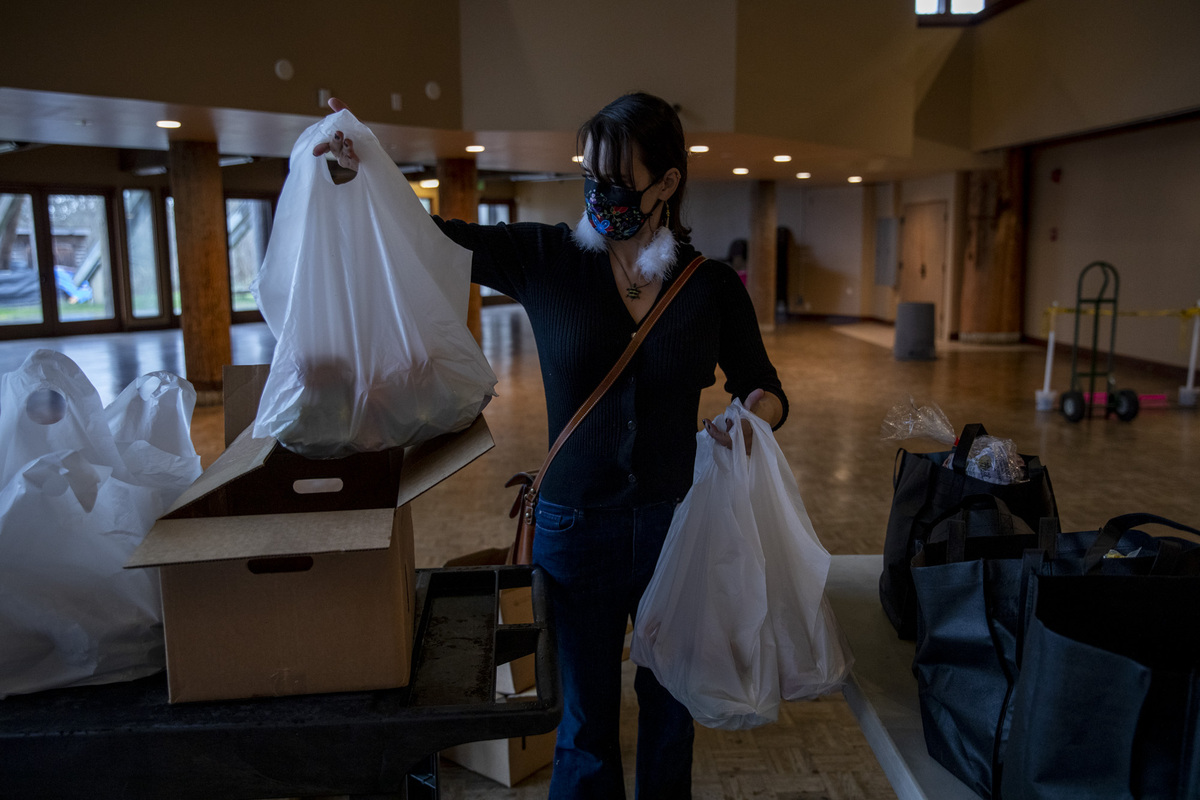
‘We’ve adopted each other’
The work of a doula encompasses all the emotional and physical assistance a parent may need throughout pregnancy. It’s an ancient practice and in many communities, including those of Native people, that natural responsibility fell to female family members of the expectant parent.
“It’s an old tradition,” says Vanessa Lovejoy-Guron, a doula working with Goldhammer who is Filipina. “This is what aunties and cousins and grandmas and moms [do] — what we do.”
But the context of doula work has changed. As Native people have been separated from their lands and practices by colonialism, some have also lost access to those traditional methods of health care now reserved only for the people who have the money to afford it. Hiring a doula can cost thousands of dollars. Miles says that she worked as a postpartum doula before Daybreak Star and served mostly non-Native wealthy women.
“I remember, as I was working with non-Native and primarily affluent people just to make them more comfortable, thinking how much my community needed this,” she says.
Shelley Means (White Earth Ojibwe/Lakota), coordinator of the Native American Women’s Dialogue on Infant Mortality, says it’s vital for Native parents to get this community support. State studies have shown that Native people have an infant mortality rate significantly higher than other communities and experience the highest rate of chronic stressors. Chronic stressors can include anything from traumatic events to general lack of support — all of which have the potential to threaten the health of baby and mother.
Social isolation is an especially prevalent stressor in her work, Means says, especially as urban Native people frequently find themselves separated from their families and tribal communities.
“From the Indigenous perspective, that is heartbreaking,” Means says. “The connectedness between generations is so important, and it’s something that’s been lost to us for so many reasons of racism and history and policy.”
The first organizers for the Native American Women’s Dialogue on Infant Mortality met in King County in 2001. The meeting brought Indigenous leaders together to brainstorm solutions to the issue, providing cradle boards and other services for Native parents. Others eventually followed suit: Open Arms has offered doula services for marginalized communities in King County since 1997, but in 2016, the organization hired Memorie Gladstone (Blackfeet/Tiikuni) as its first outreach doula for American Indian/Alaska Native community members. It was the first Native-specific doula program in King County.
The response was overwhelming. Within weeks, Gladstone says there were dozens of people interested in the program, enough so that she had to turn some away. The organization hired a second doula to keep up with the demand, and Gladstone says the program’s doulas today are consistently booked.
These conversations gave rise to the effort led by Goldhammer and after its launch, the doula program that began at Daybreak was also instantly in demand. Goldhammer had aimed to reach 25 clients during their first year; by the end of December 2020, the program had served 54 families. Goldhammer says it has added at least a dozen more clients to that list this year.
For Gladstone, the relationships she has with her clients are built on trust and mutual understanding. As a Blackfeet woman, she intuitively knows what it’s like for those who feel far away from home and family.
“We've adopted each other,” she says. “My tribe is from Montana, and there's a lot of people that come from a lot of different tribes around the area — there’s a lot of people that come from Canada, from Alaska. Building the relationship here is something that everybody looks for.”
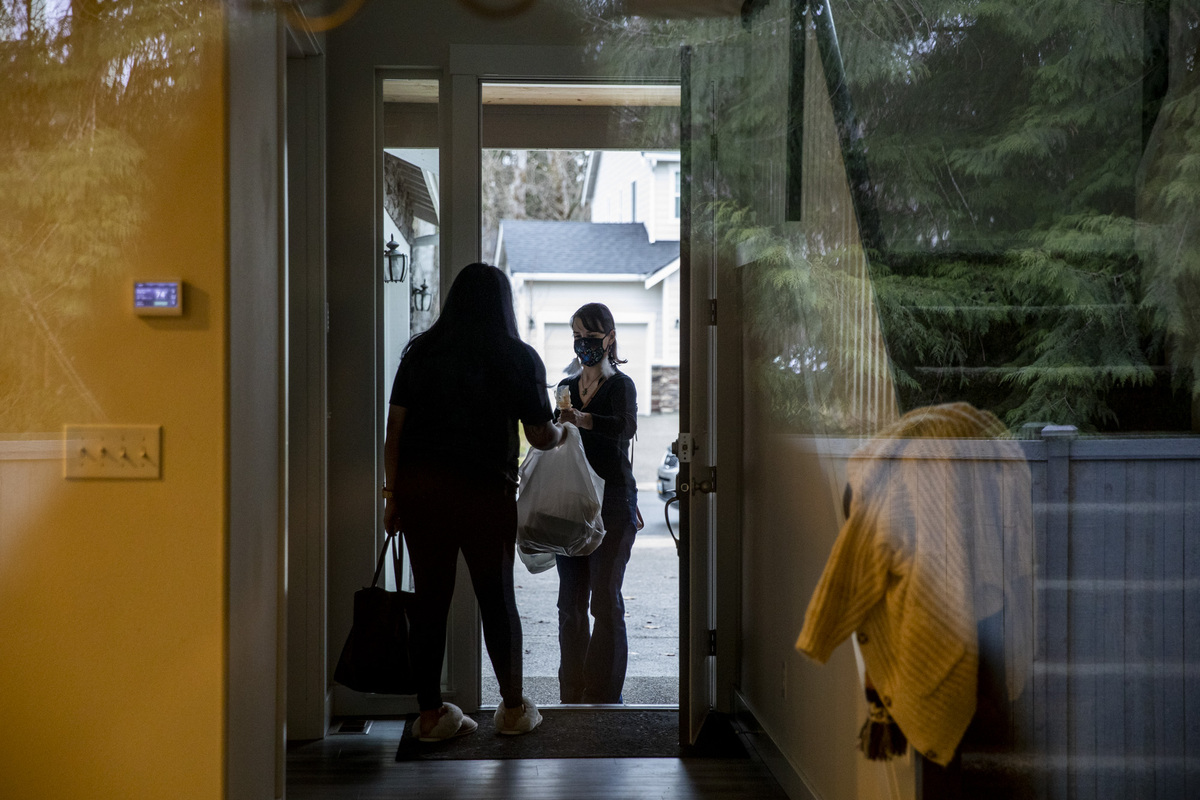
Becoming second family
For Miles, the work of a doula is tied to her normal life. She answers texts or calls as quickly as she can. When a client is close to giving birth, she keeps her phone nearby and waits for their call.
And she remembers the little details of each birth she’s witnessed, the chronology of the days and nights spent at the bedside of each laboring mother. When talking about her clients who’ve given birth, she can recite the day and time they entered the hospital, what it was like when she arrived, how they felt and what she did to comfort them. Like other doulas in the program, she delivers Native medicines such as nettle tea or sweetgrass to clients who want them. She frequently sings an Ojibwe lullaby to newborns.
The Indigenous way of doula work is to treat clients as family. Miles says it brings her closer to both her clients and her own identity.
“It’s amazing to just be able to be myself in a professional setting all the time,” Miles says. “I've never had that before. I don't have to hide anything about myself, and it’s very helpful for a lot of my clients.”
Though doulas are now allowed to attend births again, much of the work this past year was done virtually. Many of her clients are teenagers who prefer texting to FaceTime or Zoom — which means sometimes her first face-to-face meeting with expectant parents happens in the hospitals. She remembers standing over a client once on a hospital bed, working to shimmy a blanket under her hips only shortly after they’d said their first hello.
“I was like, ‘You know, this would be a lot less awkward if we’d gotten to know each other,’” she says. “That was the icebreaker.”
Occasionally, she has managed to meet clients beforehand outside and at a distance. That was the case for Starr Warner (Diné), whom she met for the first time in a park in the early fall of 2020. The two spoke to each other from a slight distance, taking extra precautions because of the pandemic.
Warner, who moved to Seattle in 2018, says she was nervous. Growing up on the Navajo Reservation, she had received care only from Native physicians. It wasn’t until she was pregnant with her first child that she realized she was going to have a child off reservation, at a non-Native hospital, in a city she didn’t know well.
“As a Native woman, I just felt totally scared and unprepared,” Warner says. “Are they going to have my best interests in hand? You always hear stories about Native people who get services outside of the reservations and being treated inhumanely.”
She wasn’t sure what it meant to have a doula — none of her family members or friends had ever used one. But the pandemic had already altered the experience of pregnancy from what she had once imagined, and she knew she wanted a Native person beside her when she gave birth.
“That’s something that you imagine doing with a couple other people, or your family, or something like that,” Warner says.
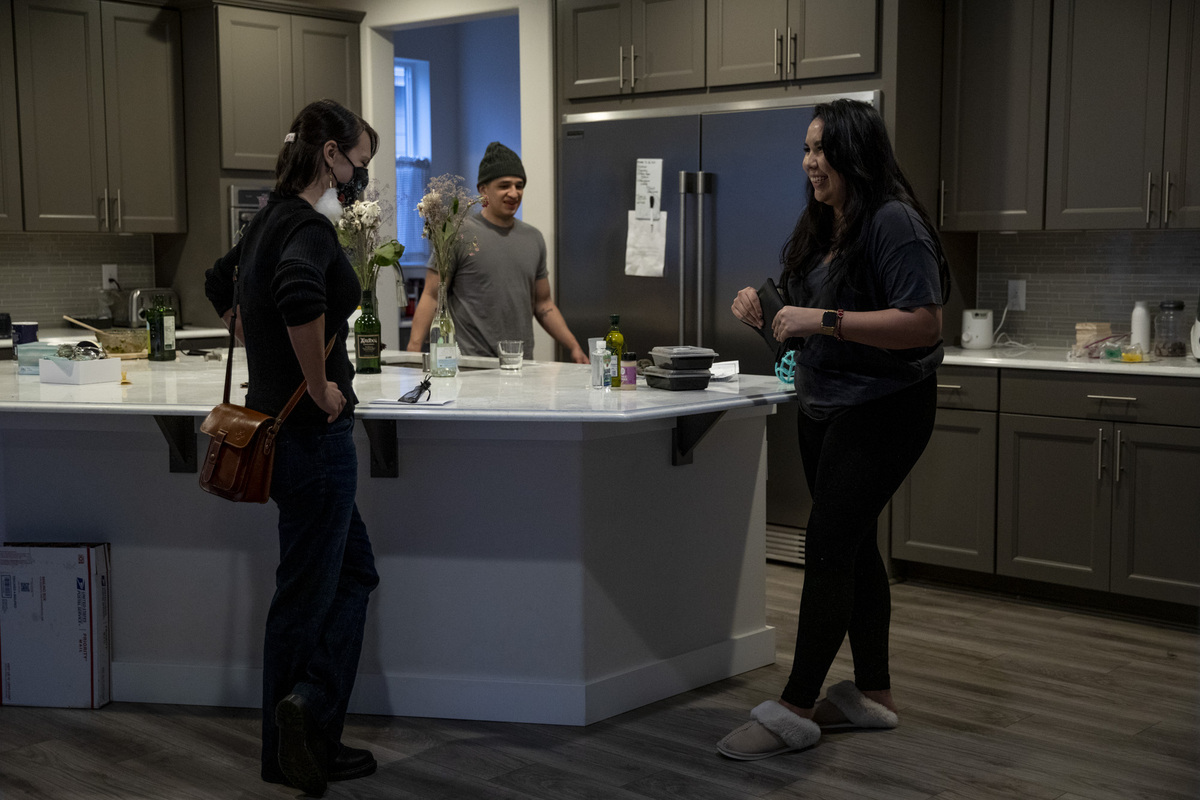
Warner says her pregnancy was easy: no nausea and few cravings. Most of the books she read cautioned her about fatigue and pain, which never arrived; she continued working out until the eighth month of her pregnancy.
The birth itself, however, was an exhausting, three-day process. Throughout, she faced unfamiliar challenges, beginning with her white nurse, who continuously missed her vein when trying to connect her to an IV. The nurse said Warner’s veins were “hard to find,” which Warner wondered might be due to the nurse’s unfamiliarity with her darker skin.
Unfamiliar, new doctors and nurses rotated in and out throughout her visit. Pitocin induced contractions for 36 excruciating hours, and she felt pressured to have a C-section despite her expressed intention to avoid one if possible.
And then, her worst fear: At one point, the nurses monitoring her baby’s heartbeat told her that they found none. She lived under frightening uncertainty for at least a couple hours until they realized the device they were using was faulty. The baby’s heartbeat was fine.
Through the chaos, the only constant was Miles. She sat beside Warner for the entire process, often speaking up when Warner was uncertain if she could. After the nurse missed her vein multiple times, leaving Warner in pain, Miles asked for a different nurse to do the job — something that Warner says she was too nervous to ask for herself.
“I was like, ‘Oh my God, thank you!’ Because I was intimidated — you’re intimidated by this room you’ve never been in before,” she says. “I was scared to say anything. I was kind of like, ‘Maybe it’s me, maybe it’s my veins.’ ”
Advocacy for patients is a key part of the gig. In her own experience, Miles has seen her Native clients have their pain or opinions disregarded by their doctors or nurses. Often, she’ll talk with her client after seeing this, asking them if they want her to speak up about it. Sometimes, she says she’s found her client’s doctor “dismissing them until I got there.”
“I’m not the doctor, I’m not the decision maker — I’m just there to advocate for her,” Miles says. “When [Warner] wasn’t being respected I was like, ‘Hey, she has this right.’ ”
This is where the Indigenous way of being a doula comes into play: In many ways, Miles says, doulas become embedded in their client’s life, serving more as an “auntie” than a strict medical professional. The role often continues long after birth.
“I’m [fulfilling] more roles than just being a doula,” Miles says. She runs through a colorful list of pre-pandemic duties: “I was a car technician, I was a house cleaner, I was a community member — I feel like, honestly, I get paid to be myself.”
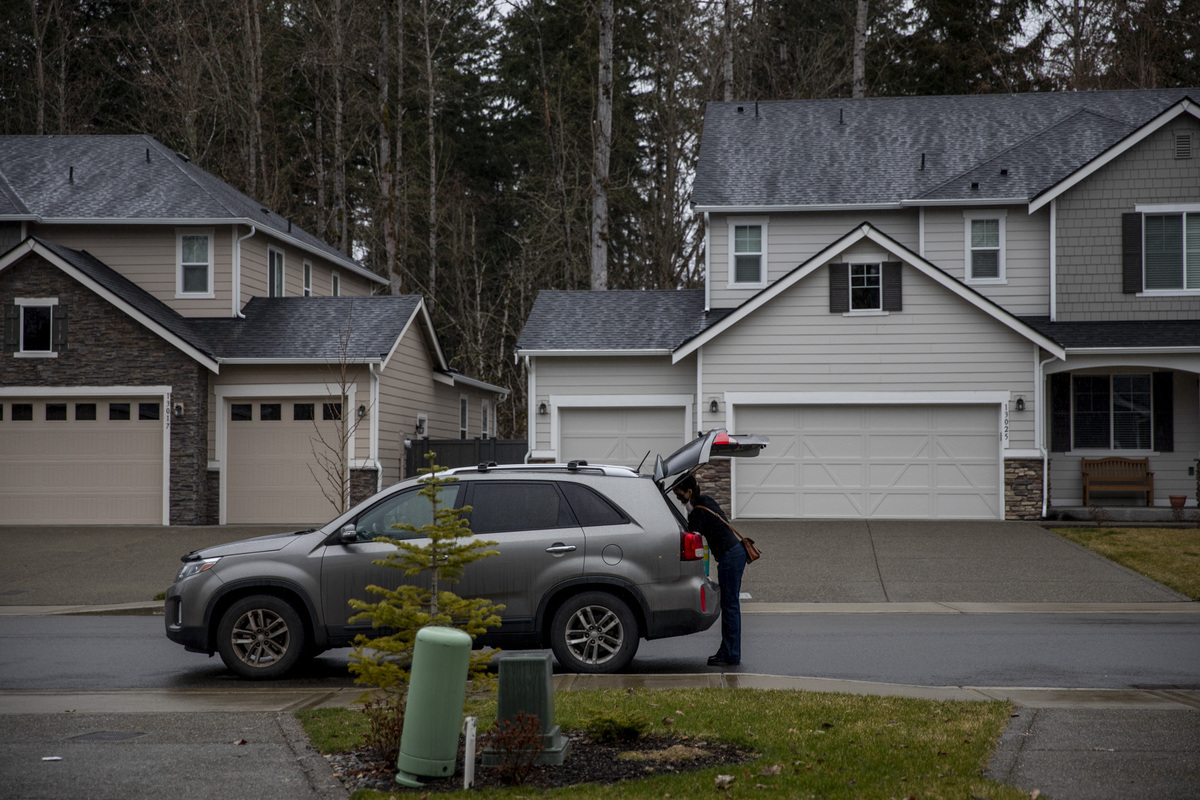
A better experience
Miles remembers the moment that she knew she wanted to do the job she does today.
“I had a baby,” she says. “And after a baby, I knew I had to do birth work.”
Miles gave birth for the first time when she was 18. She calls her circumstances fairly lucky: She had her baby at Evergreen Hospital Medical Center in Kirkland, named one of the best hospitals to give birth in the United States at the time. Additionally, her then-mother-in-law was the head of nursing for labor and delivery.
This also made more obvious the difference in treatment when she was alone: With her baby’s grandmother, Miles was treated warmly by nurses in the hospital. Without her, she says they became more dismissive and rude, frequently delegitimizing the pain she told them she was feeling.
“If this is one of the 10 best experiences in America, what is a bad experience?” she remembers wondering. “What is a mediocre experience?”
The question eventually led Miles to attend school for midwifery, which brought her to the work she does today. As vaccinations roll out —with particular efficiency in Native communities — Miles says that she’s been slowly meeting clients in person again, working to rebuild the connections she had with them before the pandemic.
Although this work began with the Daybreak Star Doulas program, Miles has since moved on and now offers her services with Lovejo-Guron through the nascent Hummingbird Indigenous Doulas program. Goldhammer started this program in May and says that it is currently taking clients through the email on its recently launched website.
But while some of Miles' clients are vaccinated, she’s had others who have recently contracted the coronavirus, causing her to be extra cautious about resuming home visits.
She has been able to meet up with some families in person — including Warner and her baby, Eros, now 6 months old. Miles has resumed her role as multipurpose helper, often helping Warner clean up around the house and performing other chores to lighten the load for the new mother.
Miles often wonders how the pandemic might ripple through generations to come. Babies used to be afraid of her when she would put on a mask, she says. But Eros doesn’t even flinch. For him, it’s completely normal.
“He just accepts the fact that I wear a mask,” she says. “At first, babies were freaked out by masks, but now it’s different.”
But one thing remains the same: She makes herself as available as possible, just as a dedicated family member might.
Warner says she has appreciated the growing connection her son has to Seattle’s Native community through Miles. And looking back, Warner sometimes wonders what would have happened if her doula wasn’t with her during her birth. Without an advocate, she wondered if she might have caved to the pressure to have a C-section, or endured more suffering than necessary, or become one of those horror stories Native mothers warn each other about.
“It wasn’t my ideal birth, but at least it was a vaginal birth the way I wanted it to be,” Warner says. “If Cassandra wasn’t there, I probably would have been one of those stories.”


